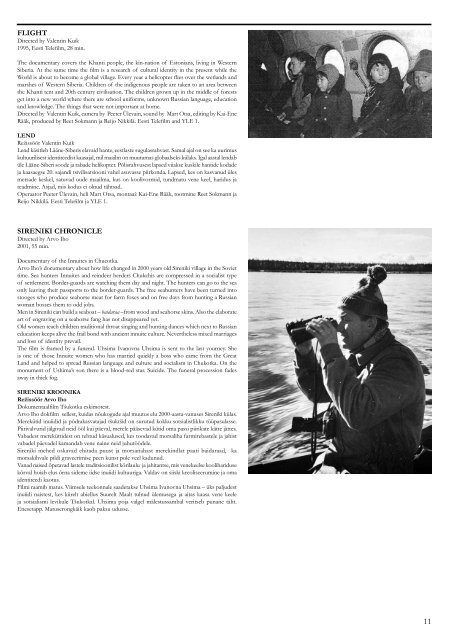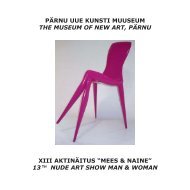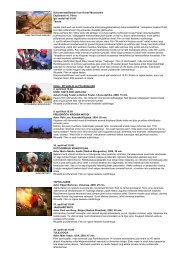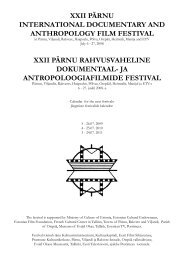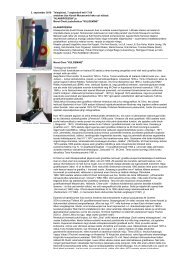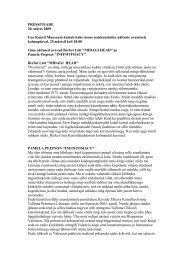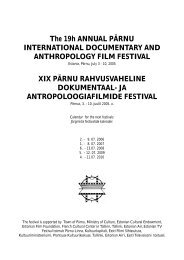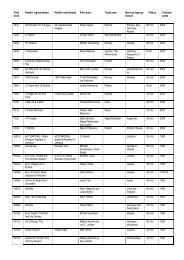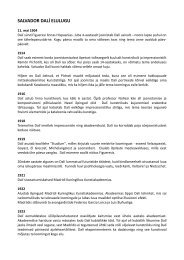xxvi pärnu international documentary and anthropology film festival ...
xxvi pärnu international documentary and anthropology film festival ...
xxvi pärnu international documentary and anthropology film festival ...
You also want an ePaper? Increase the reach of your titles
YUMPU automatically turns print PDFs into web optimized ePapers that Google loves.
FLIGHT<br />
Directed by Valentin Kuik<br />
1995, Eesti Tele<strong>film</strong>, 28 min.<br />
The <strong>documentary</strong> covers the Khanti people, the kin-nation of Estonians, living in Western<br />
Siberia. At the same time the <strong>film</strong> is a research of cultural identity in the present while the<br />
World is about to become a global village. Every year a helicopter flies over the wetl<strong>and</strong>s <strong>and</strong><br />
marshes of Western Siberia. Children of the indigenous people are taken to an area between<br />
the Khanti tent <strong>and</strong> 20th century civilisation. The children grown up in the middle of forests<br />
get into a new world where there are school uniforms, unknown Russian language, education<br />
<strong>and</strong> knowledge. The things that were not important at home.<br />
Directed by Valentin Kuik, camera by Peeter Ülevain, sound by Mart Otsa, editing by Kai-Ene<br />
Rääk, produced by Reet Sokmann ja Reijo Nikkilä. Eesti Tele<strong>film</strong> <strong>and</strong> YLE 1.<br />
LEND<br />
Režissöör Valentin Kuik<br />
Lend käsitleb Lääne-Siberis elavaid hante, eestlaste sugulasrahvast. Samal ajal on see ka uurimus<br />
kultuurilisest identiteedist kaasajal, mil maailm on muutumas globaalseks külaks. Igal aastal lendab<br />
üle Lääne-Siberi soode ja rabade helikopter. Põlisrahvusest lapsed viiakse kuskile hantide kodade<br />
ja kaasaegse 20. saj<strong>and</strong>i tsivilisatsiooni vahel asuvasse piirkonda. Lapsed, kes on kasvanud üles<br />
metsade keskel, satuvad uude maailma, kus on koolivormid, tundmatu vene keel, haridus ja<br />
teadmine. Asjad, mis kodus ei olnud tähtsad.<br />
Operaator Peeter Ülevain, heli Mart Otsa, montaaž Kai-Ene Rääk, tootmine Reet Sokmann ja<br />
Reijo Nikkilä. Eesti Tele<strong>film</strong> ja YLE 1.<br />
SIRENIKI CHRONICLE<br />
Directed by Arvo Iho<br />
2001, 55 min.<br />
Documentary of the Innuites in Chucotka.<br />
Arvo Iho’s <strong>documentary</strong> about how life changed in 2000 years old Sireniki village in the Soviet<br />
time. Sea hunters Innuites <strong>and</strong> reindeer herders Chukchis are compressed in a socialist type<br />
of settlement. Border-guards are watching them day <strong>and</strong> night. The hunters can go to the sea<br />
only leaving their passports to the border-guards. The free seahunters have been turned into<br />
stooges who produce seahorse meat for farm foxes <strong>and</strong> on free days from hunting a Russian<br />
woman bosses them to odd jobs.<br />
Men in Sireniki can build a seaboat – baidaraa –from wood <strong>and</strong> seahorse skins. Also the elaborate<br />
art of engraving on a seahorse fang has not disappeared yet.<br />
Old women teach children traditional throat singing <strong>and</strong> hunting dances which next to Russian<br />
education keeps alive the frail bond with ancient innuite culture. Nevertheless mixed marriages<br />
<strong>and</strong> loss of identity prevail.<br />
The <strong>film</strong> is framed by a funeral. Uhsima Ivanovna Uhsima is sent to the last yourney. She<br />
is one of those Innuite women who has married quickly a boss who came from the Great<br />
L<strong>and</strong> <strong>and</strong> helped to spread Russian language <strong>and</strong> culture <strong>and</strong> socialism in Chukotka. On the<br />
monument of Ushima’s son there is a blood-red star. Suicide. The funeral procession fades<br />
away in thick fog.<br />
SIRENIKI KROONIKA<br />
Režissöör Arvo Iho<br />
Dokumentaal<strong>film</strong> Tšukotka eskimotest.<br />
Arvo Iho dok<strong>film</strong> sellest, kuidas nõukogude ajal muutus elu 2000-aasta-vanuses Sireniki külas.<br />
Merekütid inuiidid ja põdrakasvatajad tšuktšid on surutud kokku sotsialistlikku tüüpasulasse.<br />
Piirivalvurid jälgivad neid ööl kui päeval, merele pääsevad kütid oma passi piirikate kätte jättes.<br />
Vabadest mereküttidest on tehtud käsualused, kes toodavad morsaliha farmirebastele ja jahist<br />
vabadel päevadel kam<strong>and</strong>ab vene naine neid juhutöödele.<br />
Sireniki mehed oskavad ehitada puust ja morsanahast merekindlat paati baidaraad, ka<br />
morsakihvale pildi graveerimise peen kunst pole veel kadunud.<br />
Vanad naised õpetavad lastele traditsioonilist kõrilaulu ja jahitantse, mis venekeelse koolihariduse<br />
kõrval hoiab elus õrna sideme iidse inuiidi kultuuriga. Valdav on siiski kreoliseerumine ja oma<br />
identiteedi kaotus.<br />
Filmi raamib matus. Viimsele teekonnale saadetakse Uhsima Ivanovna Uhsima – üks paljudest<br />
inuiidi naistest, kes kiirelt abiellus Suurelt Maalt tulnud ülemusega ja aitas kaasa vene keele<br />
ja sotsialismi levikule Tšukotkal. Uhsima poja valgel mälestussambal veritseb punane täht.<br />
Enesetapp. Matuserongkäik kaob paksu udusse.<br />
11


